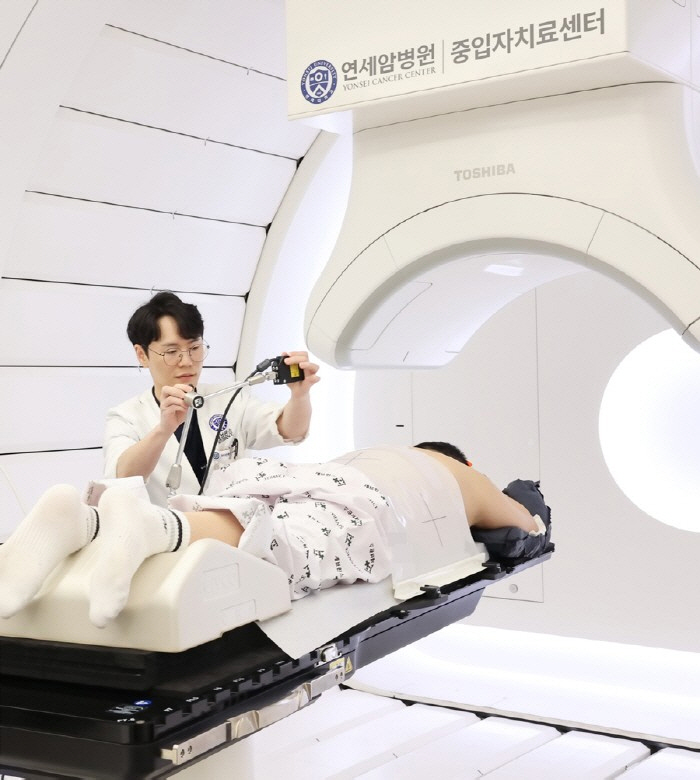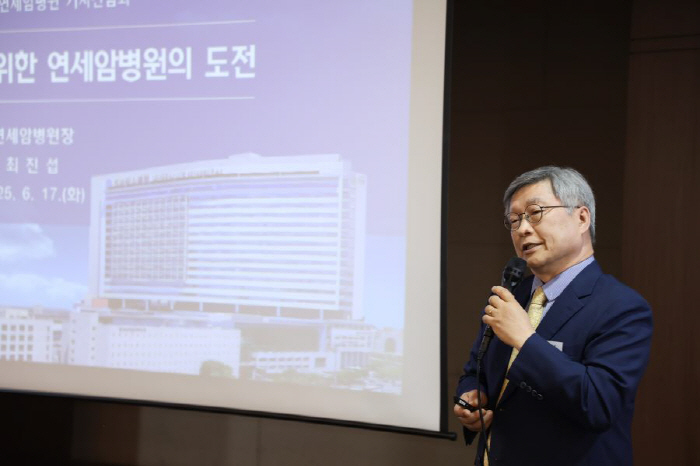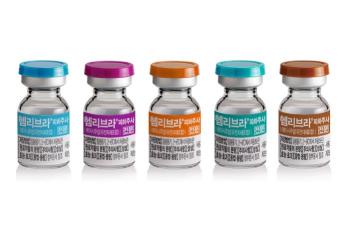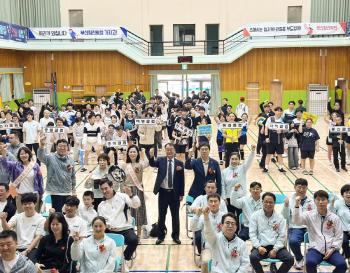Yonsei Cancer Hospital expands baryon treatment in the second half of the year...Advanced Integrated Cancer Treatment Platform
Jun 18, 2025
|
Choi Jin-seop, director of Yonsei Cancer Hospital, revealed the results of treatment for the three major incurable cancers at a press conference held on the 17th and announced a roadmap for building an omnidirectional cancer treatment system including baryon treatment.
◇ 56 years leading cancer treatment in Korea, full-scale expansion of baryon treatment
Yonsei Cancer Hospital was established as the first cancer treatment institution in Korea in 1969. Since then, it has made history of cancer treatment by introducing a linear accelerator for the first time in Korea and succeeding in bone marrow transplantation. In addition, it is leading the latest cancer treatment by introducing the first robotic surgical device in Korea and introducing a baryon treatment device in 2023.
In the field of research, it is also making global achievements, including being the only medical institution in the world's top 100 cancer research institutes selected by Nature in Korea.
Choi Jin-seop, the director of the hospital, said, `Through the past 56 years of cancer treatment experience and constant innovation, Yonsei Cancer Hospital is opening a new future in cancer treatment"We will fully operate the baryon treatment device in the second half of the year, have an omnidirectional cancer treatment system such as new drug treatment, intermediary research, multidisciplinary treatment, and robotic surgery, and open the future of cancer treatment through precision medical treatment using big data and AI." he said.
◇ Survival rate of the three major incurable cancers of lung, liver, and pancreas is higher than the domestic average
The results of the treatment of intractable cancer at Yonsei Cancer Hospital are also noteworthy.
According to Yonsei Cancer Hospital, the relative survival rate of lung cancer in Korea for five years from 2015 to 2019 is 34.7%, while the relative survival rate of Yonsei Cancer Hospital is 43.7%. In the case of liver cancer during the same period, the relative survival rate in Korea was 37.7% and that of Yonsei Cancer Hospital was 39.9%. In the case of pancreatic cancer, the relative survival rate of Yonsei Cancer Hospital is 16.5%, higher than the relative survival rate of 13.9% in Korea.
To overcome the limitations of existing standard treatment, lung cancer is in the process of introducing a whole-cycle new drug clinical treatment program and conducting an intermediary study to suggest treatment alternatives for patients who are resistant to existing immunization, target, and cytotoxic anticancer drugs.
In fact, a patient with stage 4 lung adenocarcinoma has survived for more than eight years by participating in a phase 1 clinical study of a third-generation targeted treatment because the first-generation targeted treatment was ineffective in 2014.
In addition, baryon therapy was performed instead of surgery on patients with insufficient lung function and long-term chronic underlying diseases at the age of 83 to extinguish the tumor and are currently being observed disease-free.
Baryon therapy can be a positive treatment alternative for patients with difficult-to-treat lung cancer with less risk of side effects than conventional radiotherapy 'stitial radiotherapy (SBRT)'. Meanwhile, baryon therapy, which began to be applied to lung cancer patients in June last year following prostate cancer, has so far treated 30 lung cancer patients.
Liver cancer is applied by finding the optimal treatment depending on the patient's condition, such as liver function, the degree of tumor progression, and the presence of heart or kidney disease. Along with radical treatments such as surgery, liver transplantation, and local cauterization (high-frequency heat therapy, cryotherapy), various treatments such as hepatic artery chemoembolization, radiation embolization, external radiation irradiation, and systemic treatment (cancer treatment, immunotherapy) are being combined to increase survival rates.
In the case of 71-year-old liver cancer patients, they were diagnosed with multiple liver cancer of 14cm, and 13 chemotherapy treatments reduced the cancer mass to 8.5cm, and they were cured through surgery. With the introduction of baryon therapy devices, the radical treatment effect is also increasing. In the liver cancer sector, which started baryon treatment by operating a gantry (rotational) treatment device, a total of 17 liver cancer patients were treated, including previously limited treatment cases such as recurrence patients in the liver after partial liver resection.
Pancreatic cancer has significantly increased survival rates through various new drugs and anticancer treatments. The relative survival rate nearly doubled from 8.8% from 1996 to 2000 to 16.5% from 2015 to 2019. Currently, more than 120 clinical trial experts participate in the treatment of new drugs and anticancer drugs for pancreatic cancer, and more than 400 global clinical trials are conducted annually at Yonsei Cancer Hospital. This is the largest number of clinical studies in Korea. Baryon therapy is also being actively used. So far, 100 pancreatic cancer patients have received baryon treatment.
Among the treated patients, a female pancreatic cancer stage 3 patient in her 70s received chemotherapy for six months and showed a sharp decline in the size of the tumor in the 8-month follow-up after baryon treatment, and only traces remain now.
◇ Full operation of baryons in the second half of the year...Strengthen the omnidirectional treatment system
Based on the clinical and research know-how accumulated so far, Yeonse Cancer Hospital plans to further advance the treatment system along with expanding the infrastructure for conquering incurable cancer.
In the second half of this year, one additional baryon gantry treatment device will be operated. A total of three treatment devices, including the new gantry treatment device, will be operated, and treatment carcinomas will be expanded to head and neck cancer and osteosarcoma cancer. In addition, the optimal treatment protocol will be created through the combination of existing treatment methods and baryon therapy. It is considering applying baryon therapy to expand the application of the patient group, which had difficulty in baryon treatment among locally advanced patients, and to improve treatment performance even in patients with minority metastatic cancer.
Clinical trials and intermediary studies of new drugs to overcome incurable cancer will also be further expanded. Since the opening of a new drug clinical ward in 2014, clinical research on immunological and targeted anticancer drugs has been actively conducted. In addition, it has signed MOUs with a number of multinational pharmaceutical companies to cooperate in new drug development and clinical trials, solidifying its position as an internationally recognized research institute.
◇Advanced research and treatment platform for conquering incurable cancer
Robot surgery area will also be strengthened. Robotic surgery minimizes incision sites, resulting in low postoperative pain and short recovery periods, resulting in high patient satisfaction. Yonsei Cancer Hospital has been developing techniques that are recognized as international standards in the field of robotic surgery, and in 2023, it achieved 40,000 robotic surgeries for the first time in the world. In line with the increasing proportion of robotic surgery, the plan is to further advance surgical treatment capabilities, including the introduction of additional 5th-generation Da Vinci robotic surgery machines.
We have also established a big data-based treatment support system. Currently, Yonsei Cancer Hospital is using the cancer big data platform 'CONNECT' to realize precision medical care. CONNECT is a cancer-specific big data platform built based on standardized cancer clinical data produced by 10 cancer treatment institutions, including Yonsei Cancer Hospital and the National Cancer Center. In addition, Yonsei Medical Center's integrated research platform and cancer precision medical DB are used together to provide optimal treatment based on big data.
Artificial intelligence-based research for the conquest of incurable cancer is also actively underway. It has developed a surgical assist system to achieve precise surgery by incorporating AI deep learning technology into the robotic surgery area, and recently developed software to predict the effectiveness of immuno-oncology by analyzing histopathology photos of cancer patients. This technology increased the accuracy of prediction by 15% by using only four of the approximately 23,000 genes.
Yonsei Cancer Hospital plans to work harder to lead future medical care based on precision medicine by combining quantum computing technology, which has recently attracted attention.
In addition, Yonsei Cancer Hospital operates five specialized centers, including a cancer prevention center, a cancer knowledge information center, a personalized treatment center, a scar molding laser center, and a palliative care center, to provide comprehensive treatment for the disease called cancer beyond a simple treatment-oriented approach.
These centers operate under the concept of 'Cancer Life Cycle', which covers recovery and quality of life after treatment from the pre-diagnosis stage, and provide psychological and physical support and customized treatment for each patient's disease stage. Cancer treatment does not end with simple surgery or chemotherapy.
The entire process experienced by cancer patients, from fear and anxiety immediately after diagnosis, side effects of the treatment process, recovery and recurrence management after treatment, and maintenance of the quality of life of terminally ill patients, requires a highly integrated support system. Yonsei Cancer Hospital is creating an integrated patient-centered treatment ecosystem by organically cooperating with centers with expertise in each sector in line with this trend.
Director of Hospital Choi Jin-seop "Yeonseob Cancer Hospital has changed the paradigm of cancer treatment such as robotic surgery and baryon treatment as the first cancer center in Korea."We will continue to develop a world-class research and treatment platform so that patients can experience the best medical value." he said.
|
This article was translated by Naver AI translator.















